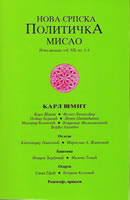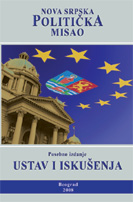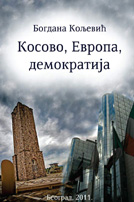| NSPM in English | |||
Forced Acceptance of Genocide |
 |
 |
 |
| субота, 10. април 2010. | |
|
(Monday, March 29, 2010)
It was right after scoring a few political points and regaining some public support, after Tadić decided not to attend the meeting in Brdo near Kranj and thus gave an adequate response to renewed outside pressure regarding Kosovo, that Serbian authorities unnecessarily got into trouble about the Srebrenica Declaration, after which nobody will remember the small diplomatic victory in Kranj and Jeremić’s riposte to Bernard Kouchner. We must bear in mind that the occasional success and accomplishments are mostly hypothetical, limited and verbal, whereas the failures are predominantly irremediable, strategic and crucial. The facts that on March 24, anniversary of the NATO bombing, president Tadić met Ivo Josipović in Opatija and that Serbian Parliament started discussing the Srebrenica Declaration Draft might be purely coincidental, or premeditated symbolism. Anyway, this symbolism is not good, regardless of its vague resemblance to the French-German truce after the Second World War, which changed Europe and paved the way for the creation of the European Union. In this small and dirty war of Yugoslav succession that took place in the Balkans there were atrocities and crimes, like in any other war, particularly in a civil one. The perpetrators must be brought to justice, but fortunately, there was no organized death industry. There was no Holocaust, Auschwitz, the Warsaw Ghetto, Hitler, Nazis, or Jews, regardless of how the parties in this conflict tried, more or less successfully, to present themselves as “Jews” and label their opponents as “Nazis”. It is not much of a consolation, it does not mean much to the victims, and is hardly likely to exonerate the perpetrators. However, that is the way the things are now, and all the rest simply boils down to thinly-disguised attempts to make some political profit out of other people’s and general misfortune. As I have said, there are no innocent parties in this last Balkan war turmoil, but nor are there unilateral responsibility or culprits, like Hitler and his Reich. Every attempt to isolate the crime in Srebrenica (or presenting Milošević as Hitler) is therefore both factually and ethically unacceptable and is a violation of truth and offence to victims on all three sides, regardless of the motivation. Both the first and second stages of this lead to the assumption that the Serbs should bear the burden of collective guilt, at least in some way, and to calls to eliminate the “genocide entity” epitomized by Republika Srpska. And sooner or later they might be followed by war reparations claims, political self-castration and relinquishing any ambitious national project in the future. At this moment, while I am writing this text, it is not quite certain whether the declaration will be adopted instantly and then be covered up by spinning and new scandals. It is not even known if the proposed Draft will be adopted. Apparently, the ruling coalition-LDP-Progressive Party triangle will resume hectic negotiations it until the last moment. But there is no good formulation or solution for something that has been unfortunate since the beginning, starting with the crime itself up to its ruthless instrumentalization in these fifteen years. And it is quite obvious that at this moment the Declaration will cause turmoil and frustration among all sides rather than be a real contribution to “truth and reconciliation in former Yugoslavia”. The fact that Serbian (and “Serbian”) media, or to be more precise, the media from Serbia, do not focus on whether we need this declaration at all, but on whether to mention the word “genocide” speaks for itself both about our media and policies. Thus, for example, in the most popular daily paper (Blic, March 25, Thursday, p.3) one could read complaints about the Srebrenica Declaration, in which the word “genocide” will probably not be used, and it leads us to the conclusion that the ruling coalition’s “primary goal was to satisfy all ruling parties, instead of condemning this crime in a clear and dignified way” (italicized by Đ. V.). One can hardly remain indifferent after noticing the atmosphere in Serbian media. Seemingly angry statements by Mufti Zukorlić are just a red herring on the one side, and on the other, an indicator of fight for prestige in the Bosnian political camp. Finally, his “indignation” can be useful to the government, which can thus present the declaration as a “balanced document”, which is condemned by “extremists on both sides”. It is clear why Bosnian Muslims insist on this declaration. It is clear why Croatia is anxious about it, too. We can understand why Brussels would greet it with approval. It is perfectly clear why it would be music to German ears, genocide included. (It is not easy to carry the burden of proven genocide on your own throughout history and it wouldn’t be bad to distribute the burden in a “fairer” way and leave some share of it on Serbian shoulders). However, it is still a mystery what made Serbian government, already encumbered by problems and difficulties, venture into something which will have a detrimental effect on the government itself, on the country and the people. Therefore, I am today convinced, more than two months ago, that the point given in the text entitled “Premeditated Suicide” is still valid. To be precise, if the Srebrenica Declaration is not a condition for European integration, then the issue should not have been raised at all because it is nothing but trouble. If it is, then Serbia should have refused to comply with the ultimatum, politely, but with determination and by using arguments, that is to say that we should have waited until the Sarajevo-Belgrade-Zagreb triangle started and brought into accord a similar and adequate initiative to condemn all war crimes, including “one’s own”. In this way we will once more turn out to be bigger Catholics than the Pope himself. I don’t want to say “fools”. |
Остали чланци у рубрици
- Playing With Fire in Ukraine
- Kosovo as a res extra commercium and the alchemy of colonization
- The Balkans XX years after NATO aggression: the case of the Republic of Srpska – past, present and future
- Из архиве - Remarks Before the Foreign Affairs Committee of the European Parliament
- Dysfunction in the Balkans - Can the Post-Yugoslav Settlement Survive?
- Serbia’s latest would-be savior is a modernizer, a strongman - or both
- Why the Ukraine Crisis Is the West’s Fault
- The Ghosts of World War I Circle over Ukraine
- Nato's action plan in Ukraine is right out of Dr Strangelove
- Why Yanukovych Said No to Europe

.jpg)








 I don’t know whether it is just a coincidence, but it keeps repeating on and on. When it seems that the government has made a smart move, it immediately makes three bad ones, making the smart move futile, go back to square one and make the situation even worse than it used to be.
I don’t know whether it is just a coincidence, but it keeps repeating on and on. When it seems that the government has made a smart move, it immediately makes three bad ones, making the smart move futile, go back to square one and make the situation even worse than it used to be.












